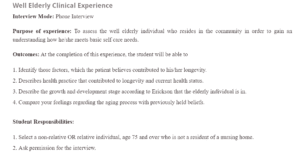Well Elderly Clinical Experience
This report details the outcomes of a phone interview with 75-year-old Jennie (not her real name) on the subject of ‘well elderly and clinical care’ conducted on 13 Oct 2020. Prior to starting the interview, the participant was informed of the purpose of the interview and was assured that all the information collected will be kept highly confidential. After getting her consent, Jennie was asked to identify the factors and health practices that have significantly contributed to her longevity and current health status. Therefore, this report will not only describe Jennie’s responses but will also use evidence to validate the growth and developmental state she is currently in based on Erickson’s theory. Finally, I will compare my feelings regarding the aging process with the previously held beliefs.
Firstly, Jennie describes her health as being great because she is capable of moving herself around and can independently take care of herself (including cooking, bathing, walking, washing her clothes, going to the shop, and so on) with very little support from family members or healthcare workers. She is currently not enrolled in any special elderly care facility and is living with her 40-year-old daughter who is working as a teacher in a local school. Despite being a diabetic, Jennie says she does not have blood pressure, arthritis, cancer, heart disease, or any other co-morbid disease associated with old age. Though she has managed to control her diabetes, she rarely takes the medication. Jennie also describes herself as being happy and expects to live until her late 90s.
According to Jennie, a combination of factors has significantly contributed to her longevity and current health status, including health practices and choices, genetics, cultural beliefs and her attitude, ethnic factors, the environment, and a bit of luck. Regarding genetic contribution, Jennie remarked that her longevity might stem from her family members because everyone seems to hit old age. Her mother and father both died in their 90s, and her elder sister is currently 86 years and still counting. Jennie thinks that the fact that her family carries genes that are resistant to disease or genes that cannot predispose them to hereditary conditions, such as sickle cell anemia, might explain why she has lived for so long. Secondly, Jennie attributed her longevity to her health choices and attitudes. She says she eats plenty of fruits and vegetables, nuts, brown bread, and starch as opposed to processed foods and red meat. She also trains every day and never smokes or drinks alcohol. Studies have demonstrated that genetics and healthy life choices can play an important part in influencing the longevity of an individual (Passarino, De Rango, & Montesanto, 2016). Finally, besides just luck, Jennie attributes her longevity to her cultural beliefs whereby “slimmer” is considered better than “fatter” or plump. She has, therefore, attempted all her life to remain skinny rather than gain weight.
Therefore, Jennie is currently in Erickson’s 8th and last stage, the phase of integrity vs. despair. In particular, because she has managed to stay healthy even after celebrating her 75th birthday, Jennie is in a state of integrity rather than despair. She is fully satisfied and confident that she has more energy and years left in her. She cherishes and reflects back on her life choices with joy and pride rather than regret. It is important to note that Erikson’s psychosocial theory is an 8-stage model that was modified from Freud’s psychosexual theory (Orenstein & Lewis, 2020).
In conclusion, I believe there is a huge difference between Erikson’s psychosocial aging theory and what I previously knew to be the right way of aging. I believe that aging falls into five main categories: self-sufficiency, independence, dependency, crisis management, and end-of-life. Based on this model, I think that Jennie is in the dependency phase because she is not managing any long-term illness (stage 4) or was admitted to any nursing home where she is expected to see her life out (stage 5). It is also important to note that therapeutic and non-therapeutic communication is a critical nursing practice that can increase the patient’s participation in her care. For elderly patients like Jennie with chronic illnesses, such as diabetes, it improves their satisfaction and speeds patient recovery through education.
References
Orenstein, G. A., & Lewis, L. (2020). Erikson’s stages of psychosocial development. Treasure Island, FL: StatPearls Publishing. https://www.ncbi.nlm.nih.gov/books/NBK556096/
Passarino, G., De Rango, F., & Montesanto, A. (2016).Human longevity or lifestyle? It takes two to tango. Immunity & Aging, 13(12). doi: 10.1186/s12979-016-0066-z
ORDER A PLAGIARISM-FREE PAPER HERE
We’ll write everything from scratch
Question 
Well Elderly Clinical Experience
Interview Mode: Phone Interview
Purpose of experience: To assess the well elderly individual who resides in the community in order to gain an understanding how he/she meets basic self care needs.
Outcomes: At the completion of this experience, the student will be able to

Well Elderly Clinical Experience
- Identify those factors, which the patient believes contributed to his/her longevity.
- Describes health practice that contributed to longevity and current health status.
- Describe the growth and development stage according to Erickson that the elderly individual is in.
- Compare your feelings regarding the aging process with previously held beliefs.
Student Responsibilities:
- Select a non-relative OR relative individual, age 75 and over who is not a resident of a nursing home.
- Ask permission for the interview.
- Set up a date and time to Phone interview the individual.
- Use appropriate basic communication and interviewing skills to establish a nurse patient relationship.
- Adhere to the format as designed below
- Submit type written report that addresses the Well Elderly clinical experience objectives; refer to the Well Elderly Clinical Rubric.
The written work submitted must cover all the outcomes listed above, must be well thought out, organized, and adhering to proper use of grammar and spelling. A 2-3 page written report in APA format must be submitted to the clinical instructor. Use the Well Elderly Rubric.
